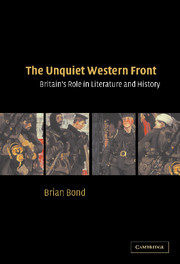Book contents
- Frontmatter
- Contents
- PREFACE AND ACKNOWLEDGEMENTS
- 1 THE NECESSARY WAR, 1914–1918
- 2 GOODBYE TO ALL THAT, 1919–1933
- 3 DONKEYS AND FLANDERS MUD THE WAR REDISCOVERED IN THE 1960S
- 4 THINKING THE UNTHINKABLE THE FIRST WORLD WAR AS HISTORY
- SIR LEES KNOWLES (1857–1928)
- THE LEES KNOWLES LECTURES
- NOTES
- SELECT BIBLIOGRAPHY
- INDEX
4 - THINKING THE UNTHINKABLE THE FIRST WORLD WAR AS HISTORY
Published online by Cambridge University Press: 20 July 2009
- Frontmatter
- Contents
- PREFACE AND ACKNOWLEDGEMENTS
- 1 THE NECESSARY WAR, 1914–1918
- 2 GOODBYE TO ALL THAT, 1919–1933
- 3 DONKEYS AND FLANDERS MUD THE WAR REDISCOVERED IN THE 1960S
- 4 THINKING THE UNTHINKABLE THE FIRST WORLD WAR AS HISTORY
- SIR LEES KNOWLES (1857–1928)
- THE LEES KNOWLES LECTURES
- NOTES
- SELECT BIBLIOGRAPHY
- INDEX
Summary
Ten years ago, in an editorial introduction to a collection of essays The First World War and British Military History (1991), I suggested that ‘The time is surely approaching, if it has not already arrived, when the First World War can be studied simply as history without polemic intent or apologies’. This hope and expectation has not been realized; indeed, the gulf between serious historical studies and popular misconceptions, encouraged by the media, may even be widening. This is a somewhat depressing state of affairs which historians must do their best to remedy. Public interest in the First World War has recently become more intense, due mainly to the development of a battlefield tourist industry, so there is certainly an audience and readership to be reached.
In this chapter I shall first explore a small sample of the works which perpetuate myths, stereotypes and caricatures about the British role on the Western Front, before concluding with a survey of some of the positive developments which provide reasons for guarded optimism about the future understanding of this very important subject.
In recent years there have been mercifully few polemical works like John Laffin's British Butchers and Bunglers of World War One (1988) or Denis Winter's Haig's Command (1991), which essentially reworked the old ‘lions led by donkeys’ theme of the 1960s with, at best, the substitution of ‘weasels’ for ‘donkeys’. Military publishers are generally aware that more scholarly, though still critical, research is now widely available.
- Type
- Chapter
- Information
- The Unquiet Western FrontBritain's Role in Literature and History, pp. 75 - 101Publisher: Cambridge University PressPrint publication year: 2002



